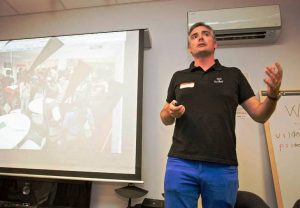by Ander Egiluz Beramendi.
There is not much to be written about John Arrillaga (the Basque-American real estate mogul who helped the Silicon Valley become what it is today) that has not already been published. Still, when it comes to talking about the Basque presence in the southern San Francisco Bay Area, the reference to Arrillaga is inevitable. “[He] is the guy who built the tech corridor where it all happened,” wrote JP Mangalindan in the July 21, 2014 issue of Fortune magazine. Nowadays, however, the Basque reality in the hottest tech spot in the world is, at most, faint, very far away from the influential decisions made by the secretive billionaire.

According to Heather Somerville, Business Reporter at the Bay Area News Group, one third of the venture capital firms investing in technology in the United States, do so in the Silicon Valley. Photo: Basque Tribune.
Since the Basque Country does not have an official census of companies operating in that area, data offered in this article is approximate. According to institutions such as ICEX, GAIA, SPRI and the Chambers of Commerce of Hegoalde (the Spanish side of the Basque Country) and Bayonne, there are about twenty Basque companies located in the Silicon Valley. All are working in the field of Information and Communication Technologies (ICTs), which is what makes the region well-known, “although there are other sectors that are growing very significantly,” in the words of Heather Somerville, Business Reporter at the Bay Area News Group specialized in covering start-ups and venture capital. “Anything related to healthcare, bioscience, and quality of life is having an impact. Like virtual doctor visits and online education.”
The world of mobile apps is, undoubtedly, one of the busiest today. “It’s trendy,” says Eneko Knörr. “There are other booming sectors, but this one is very dynamic.” Native of Vitoria-Gasteiz, Knörr is currently based in San Francisco. He is the founder and CEO of Ludei, a company that makes app-programming easier by using the same language for both Android and iPhone. Around 50,000 clients are using its system, amongst giants like Disney and Nickelodeon, as he mentions.
Along with Ludei and the rest of Basque companies, there is also an unknown number of professionals from the Basque Country working in the Silicon Valley in companies like Intel, Google, or Mozilla, to name a few. As an anecdote, there is also a pintxo-restaurant called Donostia in the town of Los Gatos, in the heart of the Valley, but the owners are American and it’s run by Hector, a third generation Galician in love with Basque food: “I wouldn’t say there are a lot of Basque people in the Silicon Valley, and if there are, they don’t really show themselves,” he says.
A lack of the entrepreneurial mind
“There is not an entrepreneurship culture in the Basque Country, nowadays,” Knörr thinks. “And that’s paradoxical, because Basques have always been entrepreneurs but, apparently, that characteristic was lost two or three generations ago. The situation might be changing, though.”

Francisco González Bree, Academic Director of the Master program in Business Innovation at the University of Deusto. Photo: Basque Tribune.
As explained by Dr. Francisco González Bree, Academic Director of the Master program in Business Innovation at the University of Deusto, in Bilbao, there is a big difference between the structure of Anglo-Saxon countries and the rest of Europe: “In Europe there is a lot of bureaucracy, which is not bad per se, but too much impedes on entrepreneurship. In the US and the United Kingdom, from an administrative point of view, it is much easier to start a business, to which the fact that young people become independent much earlier must be added.”
Carlos A. Osorio, Director of the Master program in Innovation of the Adolfo Ibáñez School of Management, in Chile, and visiting researcher at the Basque Institute of Competitiveness, wrote in the May 2010 issue of the Harvard Business Review that “about 80% of new products and services fail before their first six months.” And failure, feared but (to some extent) necessary, is also seen in a diametrically different way in the Anglo-Saxon and Basque cultures: “In the US, neither investors, nor family or friends, see failing as something bad, but in the Basque Country it’s seen as something terrible. That perception has changed a little bit because of the economic crisis but, still, if you add to that excessive bureaucracy and a youth that doesn’t emancipate until late, you get a formula that kills entrepreneurship,” states González Bree.
However, Basque entrepreneurs that decide to go abroad maintain strong bonds amongst themselves and with their homeland, “And that is important, because in the current innovation system, being connected is essential,” the Basque professor reflects.
After the economic recession of the 1980’s, the Basque Country imported the German innovation system, a model that is still alive and “very powerful,” says González Bree. “Europe, nowadays, invests 3% in innovation and the Basque Country is a powerhouse in that department. Many countries come to study the Basque model of innovation because it is very effective, and that has created an ecosystem.”

Formerly based in the Silicon Valley, Uribe-Etxebarria is now located in the Basque Country but, on average, he spends two weeks in the Bay Area every month. Photo: Basque Tribune.
But being an entrepreneur in the Basque Country is not an easy task. Xabier Uribe-Etxebarria, founder and CEO of Anboto (Best Tech Start-Up of the year in 2010) and Sherpa (a personal assistant and search engine for cell phones) said it crystal clear in an interview with the newspaper, DEIA: “[In the Basque Country] You can spend a thousand hours to get anything from a bank, while in the US, in a brief meeting, you can even reach an agreement with EBay.” Jon Oleaga, CEO of Visualbox, a visual information organizer, remembers that before going to San Francisco it was impossible for him to get decent financing, but once he settled in the Silicon Valley he was even able to connect with the Spanish bank BBVA, with whom he was not able to meet with in Madrid.

The Visualbox crew working from Madrid, Spain, led by founder and CEO Jon Oleaga (second from the right). Photo: Basque Tribune.
What the Silicon Valley has to offer and what it demands
The keyword is networking. “If you want to succeed you have to understand that there are hotspots and that you have to be connected,” says González Bree. In the technological field there are several hotspots worldwide: Beijing (China), Bangalore (India), London (England), Berlin (Germany), Boston (USA)… Still, the Silicon Valley remains “the big league,” in the words of Oleaga. “[The Silicon Valley] provides the perfect ecosystem for a technology company and is the place where all the important decisions are made,” Uribe-Etxebarria points out. “This is where the money is,” Somerville adds. In fact, one third of the venture capital firms investing in technology in the United States, do so in the Silicon Valley, she says. “There is also the Academia (Stanford University), that is located there, and that is another incentive for start-ups to go to the Silicon Valley.”
The professor at Deusto explains the relationship between universities and industry with this image − a propeller with three blades: the education sector, the public sector and, the private sector. “The university connects you to the knowledge of the world, the public sector to the laws and the funding, and private enterprises often assist you getting off the ground so later they’ll work alongside you or buy you.” González Bree calls it “the virtuous spiral.” “It’s something that energizes the country; encourages Basque people to go abroad and people from the Silicon Valley to come to the Basque Country.”
The human touch is essential to any type of business. “Multinationals send staff to a particular place when there’s something important going on,” states González Bree. And when we talk about the high risk involved in financing a start-up, the importance of human touch is multiplied by a thousand. “Investors want to see you there, they want you to be there, for possible alliances, for information… It is interesting that, despite everything being so technological, it is during the breaks at conferences and workshops where there are more chances to make first contacts with people from Google, Facebook, or any big company,” Knörr remarks.
Iñaki López de Luzuriaga was the Etxepare Institute’s visiting scholar at Stanford University between 2012 and 2013 and he witnessed the strong bonds between the academic institution and companies. “It’s like a community, and if you demonstrate your absolute availability and your total dedication you’ll have more opportunities.” And he adds: “Being from Stanford and not from another university also matters,” That is what is known as affiliation, and it has a lot of weight in the Valley.
That affiliation creates a kind of micro-nationalism which hinders access of new companies to the Silicon Valley. “It is a pretty hermetic ecosystem,” says Knörr. “Investors, first of all, want to know who you are, where you come from, whether you have common friends… Crossing that line is the most difficult, but it’s the same for someone who comes from the Basque Country as for an American from Kentucky.”
“The message is that you have to be where the action is or at least you have to plan on making many trips there,” González Bree emphasized.
What can the Basque Country do for the future?
In Somerville’s opinion, “It’s very difficult to predict what will succeed in the Silicon Valley in the future.” Yet, she mentions one thing: “The Internet of Things” −an almost unlimited connection amongst all electronic devices that will facilitate its interaction. Also, experts foresee four other technological megatrends to stay on top of: wearable devices (like Google Glass, for instance); the automation of knowledge, a good example of which is the service offered by Uribe-Etxebarria’s Sherpa; Big Data; and advanced robotics.
“If you put all that together, there is a vein of business opportunities, and the Basque Country should know its strengths,” González Bree stresses. “It seems that since smartphones are manufactured abroad the story ends there. But you can find a sub-area, such as artificial semantics, closely related to artificial intelligence, in which the Basque Country is good at.”
In the Fortune article cited at the beginning of this feature, Mangalindan indicates that if John Arrillaga had to start his investing career today he would do it in the Silicon Valley. Still, Guillermo Dorronsoro, Dean of the Deusto Business School, believes that there are other ways than just following what is being done in the Bay Area: “The success of the Silicon Valley is tied to the wave of new companies in the field of electronics and Internet, but the Basque Country should be tied to the next technological wave. Right now, we should boost the globalization of the infrastructures of knowledge such as universities and research and technology centers, and bet on one of those areas that have the potential to generate new businesses in the next decade, like Industry 4.0 or the convergence of nano bio-artificial intelligence.”
Be that as it may, the Basque Country still has everything to gain − it just has to choose a path and bet big. As economics journalist Timothy Wilson wrote: “Every amazing reality started with a faint possibility.”




Be the first to comment on "Basques in the Silicon Valley: Everything to Gain"